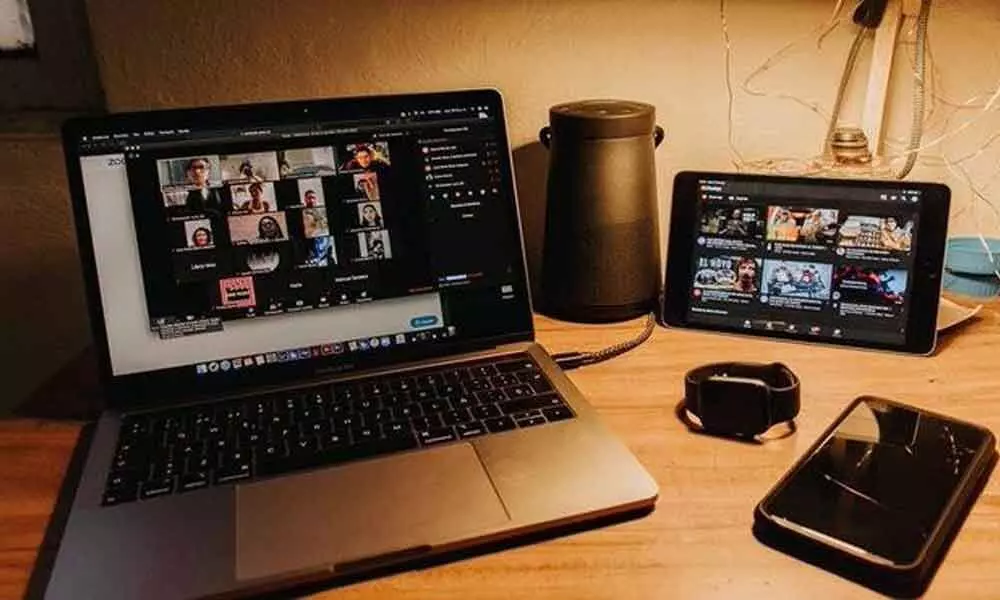Live
- They always want me to win, and now I feel lucky to have been offered a story like ‘Zebra’: Satyadev Kancharana
- ‘Democracy first, humanity first’: PM Modi in Guyana's parliament on two countries' similarities
- PKL Season 11: Telugu Titans register third straight win to top standings
- Is Pollution Contributing to Your COPD?
- NASA Unveils Underwater Robots for Exploring Jupiter's Moons
- Additional Central forces arrive in violence-hit Manipur
- AR Rahman and Saira Banu’s Divorce: Legal Insights into Common Issues in Bollywood Marriages
- 82.7 pc work completed in HPCL Rajasthan Refinery area: official
- Curfew relaxation extended in 5 Manipur districts on Friday
- Tab scam prompts Bengal govt to adopt caution over fund disbursement
Just In
Are Internet platforms adversely affecting children in India?


With the extensive proliferation of online content, free wi-fi across many locations, dirt-cheap data plans on mobile, broadband and fibre optic networks, watching online content has become the most comfortable pastime with a massive reach across youth and millennials in urban and rural areas
With the extensive proliferation of online content, free wi-fi across many locations, dirt-cheap data plans on mobile, broadband and fibre optic networks, watching online content has become the most comfortable pastime with a massive reach across youth and millennials in urban and rural areas.
Many web-series and online materials are blatantly displaying nudity, violence, obscene language, has children and growing adolescents in real or simulated sex, offends religious sentiments, and promotes and encourages terrorism. Parents, in many cases, have no idea about the content being watched by their children.
The National Commission for Protection of Child Rights (NCPCR), under the administrative control of the Ministry of Women & Child Development, Government of India, has recently taken cognizance of research highlighting 95 per cent rise in online child porn traffic during the nationwide lockdown and sent notices to reputed and most used platforms like Google, WhatsApp and Twitter citing gaps on these platforms which make children vulnerable.
The alarming fact is pornographic materials are accessible through the apps available on Google Play Store, links are available to join on encrypted WhatsApp groups, and various twitter handles are also propagating such WhatsApp group links openly.
Section 67B of The Information Technology (IT) Act, 2,000 specifically provides stringent punishment for publishing, browsing or transmitting child pornography in electronic form.
Section 79 of the IT Act and The Information Technology (Intermediary Guidelines) Rules 2011 require that the intermediaries shall observe due diligence while discharging their duties and shall inform the users of computer resources to act accordingly.
Government blocks the websites containing extreme Child Sexual Abuse Material (CSAM) based on Interpol's "Worst-of-list" shared periodically by the Central Bureau of Investigation (CBI) which is the National Nodal Agency for Interpol.
The list is shared with the Department of Telecommunications (DoT), who then directs major ISPs to block such websites. A dedicated website for information security awareness has also been set up by the Ministry of Electronics and Information Technology.
A survey conducted by a news agency in October 2019 states that 59 per cent of the respondents felt there was a lot of offensive content which was "unsuitable" for public viewing and a recent report by KPMG and OTT Platform EROS Now projected that India would have nearly 500 million online video subscribers by 2023, only second to China.
In February 2020, the I&B Ministry along with IAMAI (Internet and Mobile Association of India) came with setting up of DCCCC (Digital Curated Content Complaint Council) following 2019's self-regulation code, the "Code of Best Practices For Online Curated Content Providers", but only a few of them are on board and have signed onto this code.
Online classes are now a new normal in the Covid-19 scenario, and NCPCR has already issued an advisory to all state governments to ensure the safety of students and has mentioned that parental supervision is advised during such virtual classrooms.
But like earlier pointed out, parents themselves are not aware of the content their child is accessing on the smartphones. It depends on their education levels, their cyber hygiene etiquettes and their basic awareness of the subject.
Rajya Sabha Chairman M Venkaiah Naidu had suggested in Parliament in November 2019 that a committee comprising a few MPs should be formed to suggest concrete steps to check pornography on social media, and other Internet platforms which are adversely affecting children in India.
The government needs to run cyber hygiene awareness programmes in local languages on all media channels and newspapers and educate the people about the applicable laws. Educational institutions must inform students about the dangers of accessing objectionable online content.
Most importantly, data sovereignty laws are the need of the hour in India, and the responsibilities of the content generator, content hosting platform, content transmitter, and the content sharer all have to be fixed.
The irony is that while all such platforms earn huge revenues from sharing content and circulating it, they escape when it comes to accepting responsibility due to some legal loopholes.
On a broader level, India needs to discuss this right from Parliament to the remotest village, and a comprehensive policy supported by legislation is the need of the hour on this subject.
(The writer is the author of 'Data Sovereignty: The Pursuit of Supremacy'. The views expressed are personal)

© 2024 Hyderabad Media House Limited/The Hans India. All rights reserved. Powered by hocalwire.com






